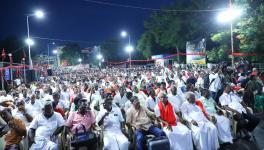SC Stays Order Directing States To Evict Persons Whose Claims As Forest Dwellers Were Rejected
Image for representational use only.Image Courtesy: live law
The Supreme Court today stayed its February 13 order in relation to eviction of persons who have not been successful in establishing their claims as forest-dwellers under the Scheduled Tribes and Other Forest Dwellers (Recognition of Forest Rights) Act 2006(Forests Rights Act). The bench headed by Justice Arun Mishra directed states to submit details of the process adopted in rejection of claims under the Forests Rights Act and the authorities which passed the orders and also whether the State Level Monitoring Committees under the Act monitored the process. The states have been directed to submit details within 4 months, and till then the implementation of February 13 order has been stayed.
The order comes in an application moved by the Centre yesterday seeking modification of the order, which would have led to the eviction of over a million persons from forestlands.
On February 13, the bench of Justices Arun Mishra, Navin Sinha and Indira Banerjee directed states to ensure the eviction of all those persons from forestland whose claims under the Forest Rights Act have been rejected.
The Chief Secretaries of Andhra Pradesh, Assam, Bihar, Chattisgarh, Jharkhand, Karnataka, Kerala, Madhya Pradesh, Maharashtra, Odisha, Rajasthan, Tamil Nadu, Telengana,Tripura, Uttarakhand, Uttar Pradesh and West Bengal were told to explain before Court why the rejected claimants have not been evicted.
They were directed to ensure eviction in all cases where rejection orders have been passed on or before July 24.
"In case the eviction is not carried out, as aforesaid, the matter would be viewed seriously by this Court", the bench had sternly warned the states.
In the application moved yesterday, the Centre sought modification of the order so as to direct the State Governments to file detailed affidavits regarding the procedure followed and details of the rejection, and to withhold eviction till then.
The Centre told that court that it is uncertain from the affidavits already filed by state governments as to whether the rejection orders were passed after due process, and whether appeal mechanisms have been properly exhausted.
The Centre said that it has been periodically monitoring the implementation of the Act by the state governments.
It has noted high rate of rejections of claims, which are mostly due to wrong interpretation of the Act. There is lack of awareness about the procedure for filing claims among grama sabhas.
In many cases, reasons for rejections were not communicated to the claimants, and they are not able to prefer appeals, the centre states in it affidavit, the Center referred to several letters sent by it to state governments in past years expressing its concern at the high rate of rejections, and unrealistic timelines followed by Monitoring Committees under the Act.
It has also noticed instances where forest authorities were trying to evict tribals without awaiting the decision of appeal, "under the Act, rejection of claim does not ipso facto lead to eviction of a tribal.
There is no provision in the Act which provides for eviction after a claim is rejected", the application read. "the applicant respectfully states that the Act is a beneficial piece of legislation and deserves to be construed liberally in favour of the FDSTs and OTFDs. The FDSTs and OTFDs are extremely poor and illiterate people and not well informed of their rights and procedure under the Act. They live in remote and inaccessible areas of the forest.
It is difficult for them to substantiate their claims before the competent authorities. The applicant has time and again attempted to sensitize the state governments while deciding their claims.However, notwithstanding, it has come to light that the claims of FDSTs and OTFDs were rejected in a summary manner where no due opportunity is provided to the claimants. The rejection orders are not communicated or the same are without reasons.
It is also noted that in certain cases, eviction orders are issued even before the appeals under the Act are exhausted". the centre stated in the application. The eviction direction came in a batch of petitions filed by an NGO Wildlife First and few retired forest officials, challenging the validity of Forests Rights Act.
According to the petitioners, the Act has led to deforestation and encroachment of forest land. The petitions filed way back in 2008 also sought recovery of forestland from possession of those persons, whose claims under Forests Rights Act stood rejected.
According to them approximately 20.5 lakh claims were rejected out of 44 lakh claims across states. "If the claim is found to be not tenable by the competent authority, the result would be that the claimant is not entitled for the grant of any Patta or any other right under the Act but such a claimant is also either required to be evicted from that parcel of land or some other action is to be taken in accordance with law", the Court had observed on January 29, 2016 in the case, before directing the states to file affidavits showing the status of claims.
IMadhya Pradesh has the highest number of rejected claims, which approximately come to 3.5 lakhs, followed by Odisha, with nearly 1.5 lakh rejected claims. Uttarakhand has the least number of rejected claims, 51.
Get the latest reports & analysis with people's perspective on Protests, movements & deep analytical videos, discussions of the current affairs in your Telegram app. Subscribe to NewsClick's Telegram channel & get Real-Time updates on stories, as they get published on our website.























